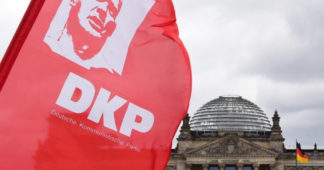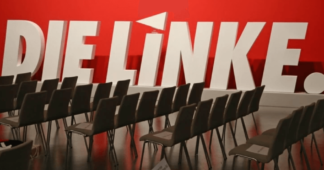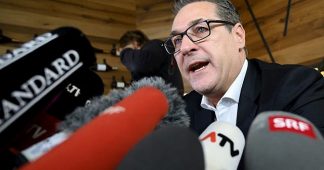By Paul Steinhardt,
Makroskop
29/09/2021
Alea lacta est …
Anyone who wants to demonstrate their knowledge of Latin could react in this way to the “provisional result of the election to the 20th German Bundestag on September 26, 2021” determined by the Federal Election Commissioner. However, he is unlikely to reap much approval.
First of all, it is indisputable that we now know that the SPD received 25.7%, the CDU/CSU 24.1%, the Greens 14.8%, the FDP 11.5%, the AfD 10.3% and the Left Party 4.9% of all valid second votes. However, there seems to be quite a difference of opinion as to what these numbers of electoral votes are trying to tell us.
What does the citizen want to tell us?
Olaf Scholz, for example, is of the opinion that with the election result, citizens have quite clearly expressed a desire for a change of government. That’s not really surprising, because the SPD likes to cast itself as an opposition party, even though it was only really in opposition for four years between 1998 and 2021 – from 2009 to 2013.
Scholz also thinks that he has to become chancellor because he won the election. Admittedly, it is doubtful whether a party that won slightly more than a quarter of the second votes and has a tiny 1.6% lead over the second-strongest party can lay even a moral claim to the chancellorship. What is indisputable, however, is that a chancellor is not elected by the voters, but by the parliamentarians elected to the Bundestag.
Moreover, the SPD must be reminded that in 1976 one of its own, Helmut Schmidt, was made chancellor with the help of the 6 percent FDP party, even though the SPD was 8 percentage points behind the CDU/CSU and the CDU/CSU only narrowly missed an absolute majority at the time. Certainly, Schmidt had a different format than Laschet. But it is not the format, but the members of the German Bundestag who decide who will be the next chancellor of Germany.
One might rub one’s eyes in surprise, but it has to be admitted that the history of Olaf Scholz as a “competence bearer” has made the SPD the strongest party in this election. However, it should not be overlooked that almost 75% of voters nevertheless did not vote for the SPD – so the citizens’ desire for a Chancellor Scholz was not so overwhelming.
Whether it was such considerations that led Scholz and the SPD’s secretary general, Lars Klingbeil, to formulate their “beam theory” is something we do not know. But it is bizarre when Scholz justifies his right to be sworn in as the next chancellor by saying that the SPD’s beam points upward and the CDU’s beam points downward. Does this mean that the SPD is arguing that the top candidate of the party with the highest increase in votes should become chancellor? Now, the SPD did gain 5.2% over the last federal election, but they were relegated to second place by the Greens (up 5.9%) in this new discipline.
The broad consensus among both party representatives and TV journalists seems to be that the dice clearly showed that German voters no longer want a “grand” coalition. This is an astonishing opinion inasmuch as in a poll presented by ARD, voters preferred this coalition, albeit by a narrow margin. Above all, this claim is contradicted by the fact that the SPD owed its gains primarily to voters who still voted for the CDU/CSU in the last federal election and that the election results undoubtedly make possible, if not a “grand” coalition, then at least a red-black coalition.
Did the citizen have a choice?
Admittedly, one could also argue that the dice are still in the air. After all, on the basis of this result, all possible party alliances for forming a coalition are conceivable. Such as: the Germany coalition (Union, SPD, FDP), Kenya (SPD, Union, Greens), a traffic light (SPD, FDP, Greens), Jamaica (Union, Greens, FDP) and, last but not least, a new edition of the “grand” coalition.
However, the fact that such a variety of government alliances seems conceivable may be taken as evidence that the die was cast long before the election. One could point to the parties’ election programs and their track record in government at the federal and state levels and conclude that there was simply nothing to choose from.
Whatever one voted for, it was absolutely certain that one would vote for a “continue-as-is.” That is probably true. The only party that stood for a real alternative in terms of economic policy never had a chance of being considered in a governing coalition. The left did manage to move out of the muckraking corner and into the “democratic camp. But it has not made a clear enough commitment to standing firmly on the ground of the “social market economy. Nor has its commitment to “Europe” been enthusiastic enough.
Olaf Scholz, for example, believes that with the election results, citizens have clearly expressed a desire for a change of government. That’s not really surprising, because the SPD likes to cast itself as an opposition party, even though it was only really in opposition for four years between 1998 and 2021 – from 2009 to 2013.
Scholz also thinks that he has to become chancellor because he won the election. Admittedly, whether a party that won slightly more than a quarter of the second votes, with a tiny 1.6 % lead over the second-strongest party, has even a moral claim to the chancellorship is a matter of debate.
Whether it was such considerations that led Scholz and the SPD’s secretary general, Lars Klingbeil, to formulate their “bar theory” we do not know. But it is bizarre when Scholz justifies his right to be sworn in as the next chancellor by saying that the SPD’s beam points upward and the CDU’s beam points downward. Does this mean that the SPD is arguing that the top candidate of the party with the highest increase in votes should become chancellor? Now, the SPD did gain 5.2% over the last federal election, but they were relegated to second place by the Greens (up 5.9%) in this new discipline.
Broad consensus among both party representatives.
Whatever one voted for, it was absolutely certain that one would vote for a “continue-as-is.” That is probably true. The only party that stood for a real alternative in terms of economic policy never had a chance of being considered in a governing coalition. The left did manage to move out of the muckraking corner and into the “democratic camp. But it has not made a clear enough commitment to standing firmly on the ground of the “social market economy. Nor has its commitment to “Europe” been enthusiastic enough.
However, the fact that a red-red-green government is not even mathematically possible is the left’s own fault. Its social-democratic regulatory position is simply not compatible with its libertarian ideology of state policy. The left was therefore certainly not an option, and it is doubtful whether its election debacle will prompt it to make a U-turn that will make it electable again in the future.
An analysis of the election programs of all the other parties confirms the thesis that there was nothing to vote for. If one also looks at the real room for maneuver, it is obvious that from a substantive perspective, all parties could easily form a coalition with each other. In terms of both regulatory policy and state policy, they are all more or less on the same line.
There will undoubtedly be some high-profile skirmishes over climate policy between the Greens and the FDP in the case of both a traffic light and Jamaica. But since the Greens also prefer free-market solutions to “bans,” a coalition with these two parties will certainly not fail because of this. Agreement will be reached on making it easier to build wind turbines, which the Greens can celebrate as a victory for the climate and the FDP as one over the bureaucracy monster. And there is not the slightest dissent about the royal road to climate neutrality via “market-based solutions” anyway.
The other topics (1) “debt brake” and (2) “taxes”, which have been piled up as stumbling blocks, also turn out to be nothing more than pebbles on closer inspection.
(1) The Greens are calling for a relaxation of the debt brake and the SPD does not categorically rule it out. This gives the FDP and the CDU the opportunity to compete over who is the Republic’s top savings commissioner, which may obscure the fact that the differences on this issue are also marginal. None of the four parties questions that a “sound budgetary policy” is of paramount importance. The issue is simply how to create more room for public investment. In any case, “the economy” should benefit from this, which is why the resistance of the CDU and FDP to creating this space via shadow budgets should not be too great. The only important thing is to keep social budgets in check. But that is also the view of the Greens, who explicitly support the debt brake for this purpose. And the SPD has already sworn, in the name of common sense anyway, that it will act within the framework of the debt brake in terms of fiscal policy.
(2) The SPD and the Greens are calling for the wealth tax to be reinstated, and they are drawing criticism from the CDU and the FDP. However, the constitutional and practical hurdles for this are so high anyway that the “left-wing” demand for its reintroduction has in fact no chance of being realized. Otherwise, tax cuts are being demanded by all parties anyway. The demands of the SPD and the Greens for more “social justice” will therefore certainly fail because of the “solid counter-financing” that all parties consider necessary.
Color games
So one could easily roll the dice on the next governing coalition. For practical politics, the color scheme of the next government will have little impact. Nevertheless, for the next few weeks, if not months, we will have to witness a production that suggests that nothing less than the fate of all humanity depends on the composition of the coalition.
The election results, however, are not entirely optimal for this play. Because now that a grand coalition is mathematically possible, it’s hard to see why anyone should still seriously consider the so-called Germany coalition or Kenya. The only realistic alternatives are the traffic light, Jamaica and the grand coalition.
Despite the intention expressed by the CDU/CSU and SPD not to form a coalition with the other party under any circumstances, one should by no means be too hasty in ruling out a grand coalition. The fact is that these two parties have been working together “very successfully” for almost an eternity – and according to their own perception.
However, neither party will certainly be enthusiastic about such a constellation. Scholz is likely to claim the chancellorship for himself, which would probably finally expose the fairy tale of the opposition party as a laughing matter. Admittedly, the SPD has shown itself to be so extremely flexible in the past that a grand coalition is unlikely to fail because of it.
It would be much more difficult for the CDU/CSU to agree to a new edition of the grand coalition. There are good reasons to attribute the current election disaster to Armin Laschet, who is much better suited as a carnival prince than as a candidate for chancellor. The CDU/CSU can therefore justifiably hope that it will do much better in the next federal election with Markus Söder as its candidate for chancellor.
On the other hand, a grand coalition would allow the CDU/CSU to elegantly get rid of Laschet. Söder could then be crowned finance minister and staged as a fighter for solid budgets against the attacks of the Red Battalions. It would therefore not be at all surprising if, after long and tough negotiations, both parties grudgingly appeared before the press and invoked civic responsibility to portray the carry-on as a marriage of convenience.
Is that what one should wish for? Perhaps so. For it is impossible to see what improvements Jamaica or a traffic light could bring in terms of the normative goal of a social democracy. Rather, it is to be feared that with a government participation of the Greens and the FDP, one will be increasingly exposed to intolerable rhetoric. The Greens will defend “humanitarian interventions” in the name of freedom, and the FDP will want to free “the economy” from state restraints.
For this very reason, a traffic light is likely to be quite unlikely. The Green party base favors such a coalition, but the grandees of the Greens are likely to be frightened when they think of having to prove themselves as a “left-wing” party now. Above all, however, it is impossible to see how the FDP will explain to its base that it wants to form a coalition with “left-wing” parties, even though there is the possibility of working with the CDU/CSU to unleash the market economy. Since the Greens also swear by the forces of the market economy, the question is why a traffic light should be preferred to the journey to Jamaica.
So it remains to be seen whether the Jamaica experiment will be dared or whether the SPD, as the perceived winner of the election, will be able to save itself in a “grand” coalition. This is not impossible, but if the FDP and the Greens can reach an agreement, this alternative should be quite unlikely. The yellow and green noises immediately after the election rather lead us to expect that both parties will not miss the opportunity to assume “government responsibility”. So, willy-nilly, we will have to adjust to a “business as usual” with unpleasant green and yellow rhetoric.
For the SPD, at least, this turns its feeling into reality. It finally becomes the largest opposition party. It can now present itself as the social conscience of the nation without being confronted with unruly reality. Nevertheless, it would be better to refrain from celebrating the rebirth of a social democratic party.
We remind our readers that publication of articles on our site does not mean that we agree with what is written. Our policy is to publish anything which we consider of interest, so as to assist our readers in forming their opinions. Sometimes we even publish articles with which we totally disagree, since we believe it is important for our readers to be informed on as wide a spectrum of views as possible.











